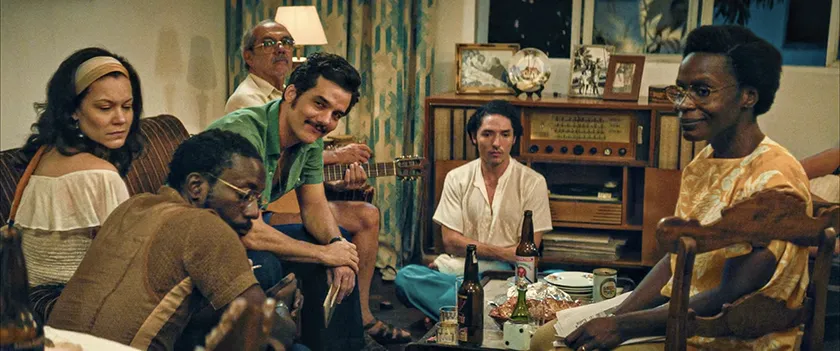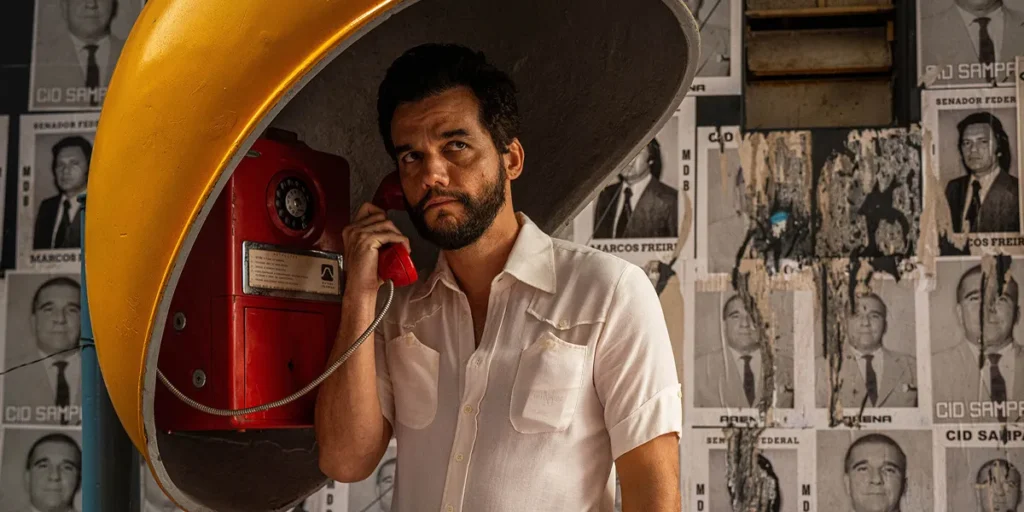The Secret Agent’s ending plays out like an epilogue but unveils the film’s motif with shocking precision. Let’s get its true impact explained.
Although the ending of Kleber Mendonça Filho’s The Secret Agent has divided audiences, the final moments of the film are an urgent reminder of the relevance of preserving our past. The movie follows Wagner Moura as Marcelo, who arrives in Recife hoping to reunite with his family and stay out of sight of the dangerous men looking for him.
The Secret Agent has all the attributes of a standard psychological thriller, but its true impact lies in the brief glimpses we see of the present, which follow two history students studying archival footage from Brazil’s dictatorship. Moving on to spoiler territory, let’s get the ending of The Secret Agent explained.
What Happens At the End of The Secret Agent
The Secret Agent reaches its climax with an intense game of cat and mouse involving the film’s pair of hitmen, the unreliable gunman they hire, and a desperate Marcelo. As all the opposing forces of the movie clash in a violent fashion, suspense takes over the narrative, leaving a trail of blood behind. The quiet, subdued thriller finally shows its claws, and there’s really no way of knowing who will make it out alive.
After the hired gunman is ambushed by the police, he shoots two cops and runs away. One of the hitmen tasked with tracking down Marcelo follows in his wake to clean up the mess, but is killed by the gunman. As the villains of The Secret Agent turn against each other, Marcelo takes the opportunity to pack his things and go. I felt a rush of adrenaline when he picked up the phone and announced he had to leave town immediately.
This turned out to be a very brief moment of relief: in a shocking twist, The Secret Agent transports us to the present, and we learn from a newspaper headline that Marcelo never made it out of town. The circumstances of his death are erased within the narrative, mirroring the fate of many innocents who fell victim to Brazil’s dictatorship.
The time jump in The Secret Agent’s ending divided audiences following the explosive chase sequence, with many calling it anticlimactic. However, the film’s final scene gives depth to its frame story and reveals its true intentions in a sorrowful note. It offers two secondary characters their chance to shine: Flávia (Laura Lufési) a history student, and Fernando (Wagner Moura), Marcelo’s son. Flávia travels to Recife to meet Fernando, now a doctor. They reminisce about Marcelo, and it becomes apparent that Flávia knows him better than his own son after having access to Marcelo’s recordings and testimonies.
How The Secret Agent Deconstructs the Figure of the Anti-Hero
The Secret Agent is, essentially, a movie about gaps in memory and history passed on from one generation to the next. Similarly to the award-winning I’m Still Here, Kleber Mendonça Filho’s film is set against the backdrop of the military dictatorship in Brazil, a time of suppression of free speech, where the resistance had to either face torture – and in many cases, death – or flee far away from their homelands. Like I’m Still Here’s Eunice Paiva, a mother who dedicated her life to seeking justice for her husband, erased by the military, The Secret Agent‘s Fernando must come to terms with the fact that he never got to truly know his father.
At the beginning of The Secret Agent, the mystery around Marcelo/Armando’s true identity sets the narrative into motion. I found myself suspecting there had to be something off about this charming and perfectly polite character, whose contagious charisma affects everyone, from his fellow political refugees to the corrupt police force of Recife, who happen to be associated with the very evil men Marcelo is running from. Early in the movie, a police officer suggests that Marcelo gives off “cop vibes.” And then the local police are instantly drawn to his persona. I strongly suspected Wagner Moura’s character could have been a policeman on the run; an anti-hero from the dictatorship. However, the idea of a Brazilian movie glorifying a law enforcer of such a bloody era, even if “redeemed”, seems absurd, at least in the times we live in.
Yet I couldn’t help but cultivate all sorts of ideas about Marcelo’s identity in The Secret Agent. I thought to myself: what if he is a cop, a spy, a killer? However, the truth about Marcelo is much simpler. Halfway through The Secret Agent, the movie gives us what’s possibly its most pivotal scene: a long-overdue sitdown between Marcelo and Elza (Maria Fernanda Candido), the leader of the resistance movement responsible for protecting Marcelo and many other political refugees. In this scene, Marcelo finally talks about his past as a professor and how his feud with a corrupt businessman made him a fugitive.
As Marcelo unveils his helplessness towards the repression imposed on him, any suspicions we fostered dissolve. There’s nothing dark about our protagonist: he is a former academic, a prolific researcher whose only crime was to cross paths with dangerous men and refuse to give up on his rights. From The Secret Agent’s opening scene, which features a cop searching Marcelo’s car, the audience is led to believe that Marcelo is hiding dark secrets. The enlightening conversation between Elza and him frees him of all charges in the eyes of the public: Marcelo is neither an anti-hero nor a hero. All he wants is the right to be a bystander, like the people he sees dancing and singing in the streets of Recife.

The Secret Agent is an Ode to Memory and Lost Archives: The Ending’s Symbolism Explained
In many aspects, The Secret Agent plays out like an extension of Mendonça’s award-winning documentary, Pictures of Ghosts. In the film, Mendonça reflects on his childhood in 1970s Recife and the places he visited – most of them gone now, or only partially there. He refers to the movie theaters that are still standing as “temples”; they sit there in downtown Recife, projecting memories of the city that once was. Mendonça showcases his passion for archival footage and documentation by mixing old city archives with his own collection of family photos and personal contemplations. Mendonça opened the time capsule with Pictures of Ghosts; in The Secret Agent, these memories take on a life of their own. The award-winning movie allows Mendonça to expand on the subject and charge it with a strong political commentary.
The Secret Agent presents one of the strangest uses of a frame story device, as the immersion of Marcelo’s story is interrupted by flashes of present-day Brazil. Flávia and Dani are two history students digging into old audio recordings and newspaper archives from the military dictatorship, which was in effect from 1960 until 1985. This seemingly loose storyline pays off only in the end. We are left to ponder the tragic circumstances of Marcelo’s death through the assumptions of Flávia, who wasn’t even born at the time, and Fernando, whose only vivid memory of that carnival is his fascination with the movie Jaws.
Flávia and Fernando’s meeting envelops the ending of The Secret Agent in a meditative atmosphere after the intense chase sequence. Thanks to his grandfather’s stories and fragmented memories of his childhood, Fernando has only a vague idea of who Marcelo was. The dictatorship deprived him of his father, just as it did to so many families in Brazil back then. There’s a clear parallel between the tragedy of this father-son relationship and Marcelo’s own search for his mother. Our “secret agent” asks to be referred to Recife’s Identification Institute to fill the gaps in his family tree. He spends a good chunk of The Secret Agent looking for his mother’s birth certificate and is killed before locating it.
The beauty of The Secret Agent’s ending lies in the symbolic resistance proposed by archival footage. Marcelo loses his battle against the past, failing to retrieve it, and almost falls victim to the same erasure experienced by his anonymous mother. We never get to see his death. His fate is sealed by a headline that refers to Marcelo as just another casualty of the dictatorship, his brilliant academic path is barely mentioned – he’s framed as an ordinary delinquent, a vagabond on the run.
Decades later, Marcelo’s memories and experiences are recovered by Flávia and passed on to Fernando. His enthusiasm is visibly restrained: this is a man whose childhood was defined by loss, whose daydreams about sharks seemed to make more sense than his dissolving reality. “I think I’m starting to forget mom”, the boy confides to his father in one scene. Years later, he has moved on from the painful memories of his father as well.
The Secret Agent’s Unexpected Ending Is Deeper Than You Think: True Impact Explained
There’s plenty of room for speculation as to why Wagner Moura plays both Marcelo and Fernando: they look exactly the same, but their attitudes differ. One way to look at it is to consider Flávia can’t help but see Fernando as an extension of his father, a physical manifestation of the archives she dug up. She heard Marcelo’s voice, saw his pictures, and in this process, channeled his image into the present.
On the other hand, it could be a nod to the many faces Marcelo wears throughout the movie. It’s a reminder that the past keeps coming back under different names, different losses, different identities altogether. Fernando may not remember, but Marcelo managed to pass a little bit of himself on to his son. One of the most moving scenes in The Secret Agent follows Marcelo driving Fernando around town. The two talk about how much they miss Fátima, Fernando’s mother, as Marcelo emphasizes that even though she’s not coming back, her memory will live on with Fernando forever.

What’s the Point of the Goofy ‘Hairy Leg’ in The Secret Agent?
Although The Secret Agent ends on a tragic note, there are many fun side-quests throughout the movie. Early in the movie, a human leg is discovered inside a shark’s belly and becomes the talk of the town. Soon, word gets around about a dangerous “hairy leg” attacking unsuspecting people in the carnival.
Marcelo’s journey never directly clashes with the mystery of the hairy leg, but the severed limb holds strong symbolic resonance with The Secret Agent’s primary motif. The local police’s obsession with getting rid of the leg heavily implies that it belongs to a missing student, and they are trying to cover up his death.
Yet the leg keeps coming back ashore, if not inside a tiger shark’s belly, then in the form of the “hairy leg” urban legend. Thanks to its popularity in the media and the supernatural properties attributed to it by word of mouth, it refuses to fall into oblivion. The leg is angry, and it will kick you to death. The Secret Agent’s “hairy leg” exhibits Mendonça’s fascination with genre cinema while working as a powerful statement against the erasure enforced by the military at the time.
The Secret Agent: Ending Explained
The Secret Agent’s impactful ending subverts the audience’s expectations. As Marcelo evades his persecutors and prepares to leave the city, the movie promotes a false idea of hope. However, its abrupt turn to grim realism hits the hardest, illustrating how the endless persecution of innocent people dictated the rules of that time.
The Secret Agent ending urges the audience not to forget about the past. It’s an ode to recorded memory and personal recollections, and the importance of confronting these contrasting perspectives. The movie does a better job of reconstructing 1970s Recife as it is remembered today than how it actually was back then, emphasizing that the city’s festive mood is a temporary bliss amid a period of persistent paranoia and suspicion. The Secret Agent feels relevant today because we are experiencing an age of canceled futures: one side is determined to look back to avoid the same mistakes, while the other insists on reframing the crimes of the past.
The Secret Agent (O Agente Secreto) was released in select U.S. theaters by Neon on November 26, 2025 and will be out in U.K. and Irish cinemas on February 20, 2026. Read our review below!

